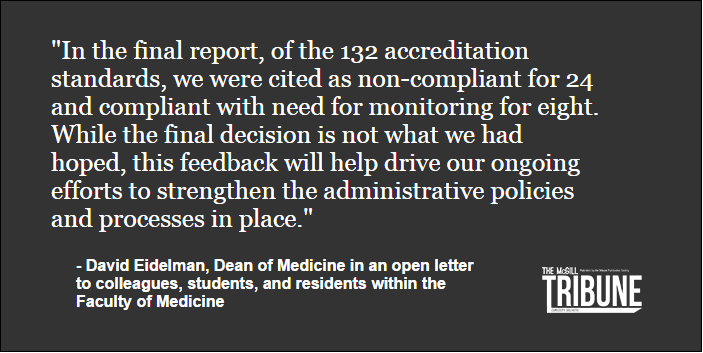On June 17 the Committee on Accreditation of Canadian Medical Schools (CACMS) and the Liaison Committee on Medical Education (LCME) put McGill’s undergraduate medical program on probationary status due to a failure to meet a variety of proper accreditation standards. The CACMS has given the university until December to create a detailed plan to fix the program’s shortcomings.
According to the CACMS report the undergraduate program within the Faculty of Medicine was found to be out of compliance with 24 accrediation standards, including disparaties in students’ learning experiences, a lack of mapping objectives to outcomes within the program, and inadequate instruction in women’s health. Additionally, the report identified eight standards that have recently been complied with but need further monitoring. These include include inadequate instruction of topics such as pain management, the health care system and policy, human sexuality, ethics, and law. Also noted was the lack of diversity within the student body and the Faculty and a lack of women in leadership positions.
Since 1979, the CACMS has existed to review the quality of Canadian medical programs before granting them accreditation.
“[The accreditation process] operates on an eight year cycle and involves a peer review by medical professionals,” Dr. Danielle Blouin, secretary of the CACMS, explained. “This review takes three or four days, and the team produces a report detailing their verdict.”
Dean of Medicine David Eidelman addressed the issues outlined in the report in an open letter to staff and students within the Faculty.
“We knew from the beginning that we were going to have to be re-reviewed,” he said, explaining that the records detailing McGill’s new medical curriculum are limited, which is partly due to the fact that it was implemented very recently. “A lot of accreditation has to do with keeping records.”
According to the report, all Canadian medical schools are required to “be responsible for monitoring the curriculum, including the content taught in each discipline, so that the program’s educational objectives will be achieved.” CACMS’ findings at McGill, however, showed that the school “lacks a well-functioning curriculum mapping system.”
Eidelman acknowledged that a combination of problems contributed to CACMS’ decision.
“This is a multifactorial issue, but none of these factors are an excuse,” he said.
Despite this, Eidelman did not expect the report of the CACMS to be as negative as it was.
“I’m very disappointed about it,” he said. “Our approach has been to be transparent about our problems, and to find a clear and direct way of solving them.”
McGill’s medical program was the first faculty of its kind to be established in Canada and was the first faculty at McGill University. Concerns have been raised as to how greatly the probationary status will affect McGill’s international reputation and rankings, something Eidelman is currently not worried about.
“The real test of an institution is not whether it does everything right, but how it responds to difficulties,” he said.
Assistant Dean of Medical Education for Campus Santé Outaouais, Dr. Gilles Brousseau, echoed Eidelman’s sentiments.
“It’s normal to be on probation when you’re modifying your curriculum,” Brousseau said. “[The Faculty has] a very good action plan and is working to fix the problems outlined by CACMS.”
The only other Canadian medical program currently on probation is the University of Saskatchewan which failed to meet 10 CACMS standards in 2013, including inadequate clinical rotations and a lack of study space.
Despite this status, the program is still accredited and current medical students will still be able to graduate. The Faculty announced an action plan framework on June 17, which includes plans to target the Class of 2016 by highlighting curriculum topics that were inadequate. The program will be reviewed again in 2017.
This article was corrected Thursday, July 9, 2015. The Tribune regrets these errors.










Pingback: Latest Faculty Of Medicine News | World Health Portal